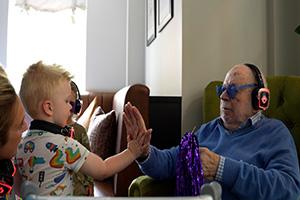Why protecting mental health is key to resilience during this crisis
These unprecedented times have seen the health and social care sector experience a huge upheaval. We’re all acutely aware of the immense pressure carers and front line staff are under as they fight an uphill battle day-in, day-out, with the country relying on them to care for the most vulnerable in our society. I think I speak for everyone when I say how incredibly proud we are of their amazing work.
While some positives have come from this situation, in terms of the huge wave of recognition and gratitude for workers in this sector, it has also brought a significant amount of stress for individuals and even greater pressure for the sector as a whole. Afterall, the sector is partly responsible for ensuring the nation's success in fighting this virus. 
This, combined with staff shortages, years of chronic underfunding within the sector, issues around accessing sufficient PPE, not to mention the fact that health and social care workers are putting themselves and their loved ones at increased risk of infection – it's no wonder that underlying mental health issues of workers will come to the fore, now and following the conclusion of this crisis.
During these unsettling times, protecting mental health and those of our colleagues is of utmost importance. Here are my tips on how to manage difficult conversations and provide a support system for the workforce:
1. Offer a listening ear
While it’s more essential than ever to check-in with colleagues to see how they’re coping, it’s also important to remember that people may find it difficult to come forward and express their worries or ask for help. By offering a listening ear and regularly checking-in shows that you care and makes it clear that you’re willing to talk when the time is right for them. Remember you are not there to judge or diagnose, just make time to talk.
2. Someone to turn to
Having qualified First Aiders for Mental Health in your team is an effective way to support employees’ wellbeing. Not only do these team members have the skills to identify pressure points and manage difficult situations, your employees will have a trusted member of the team that they can turn to.
3. Check ‘fine’ really means it
We all know that if someone says they are ‘fine’, it isn’t always the case. When we are going through challenging times it’s no surprise that people don’t want to burden others, which can lead to feelings of anxiety or stress to build up.
It might sound simple, but by checking if someone is really fine, or by saying “no, how are you really feeling?”, can encourage them to open up. If someone does express any feelings of worry or anxiety with you, it can help to relay what they’ve said back to them, to show you’re actively listening and make sure you’ve understood them correctly.
4. Remember we’re all different
We all react differently to difficult situations and it’s vital to remember that people will be impacted in different ways. While we are all uncertain about the long-term effects this outbreak will have on our lives, some of us will have increased anxiety about the health of loved ones, others will have decreased job security, financial worries, and some of us will have concerns about the effect on our children’s education.
I believe it’s essential to open the conversation and support employers and employees in mental health first aid. This is fundamental to both the individual and the organisation.
There are a range of First Aid for Mental Health courses available, which provide learners with the knowledge to recognise a range of mental health conditions, enabling them to signpost a person to appropriate help, recognise and manage stress, as well as the opportunity to qualify as a First Aider for Mental Health.
Right now, it has never been more important to look after mental health and wellbeing and listen to each other’s concerns. By continuing to support each other, as an industry, we can remain resilient and weather this storm together.
Lindsey Appleby-Flynn, Adult Health and Social Care Lead at Connect2Care





